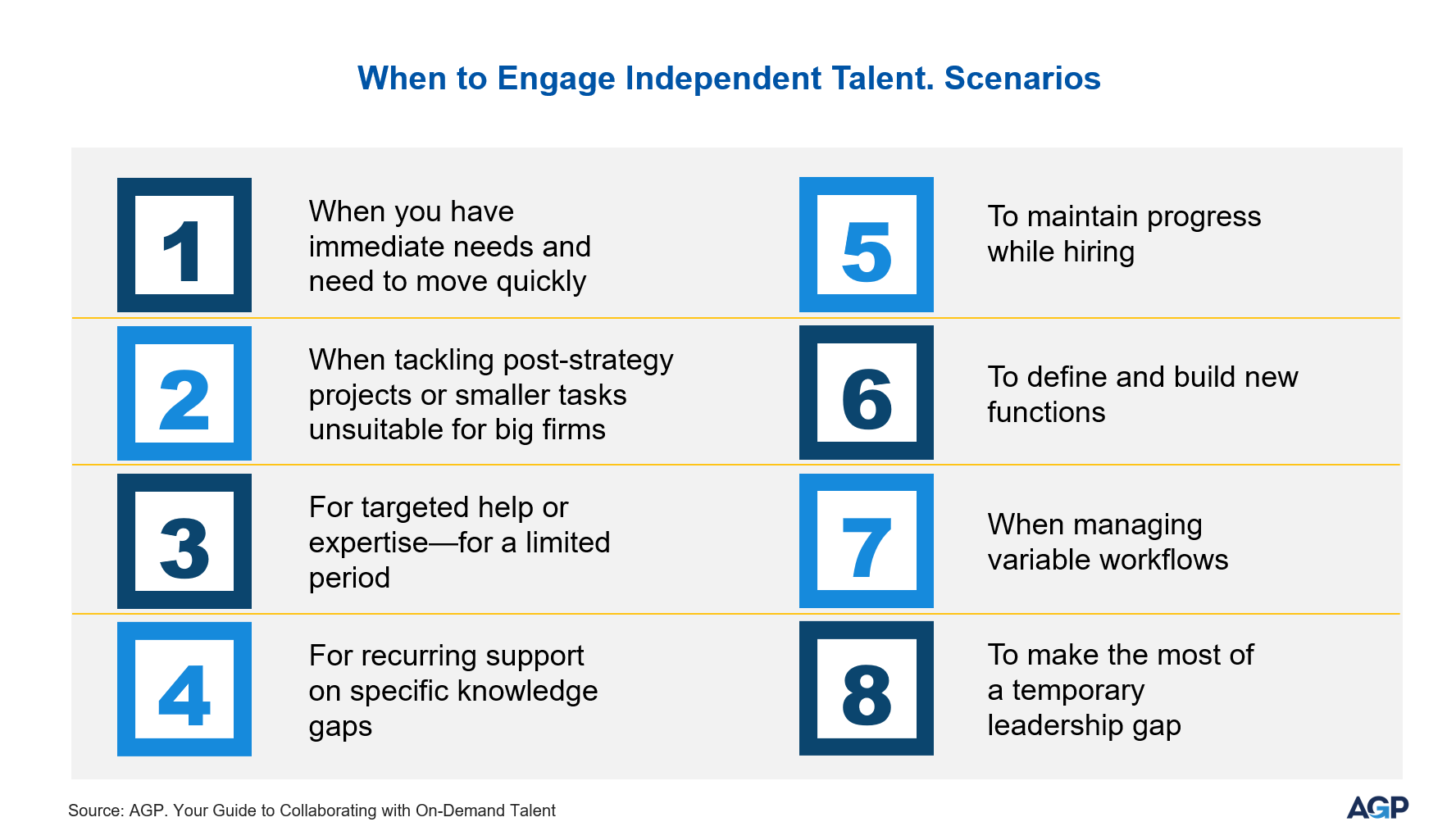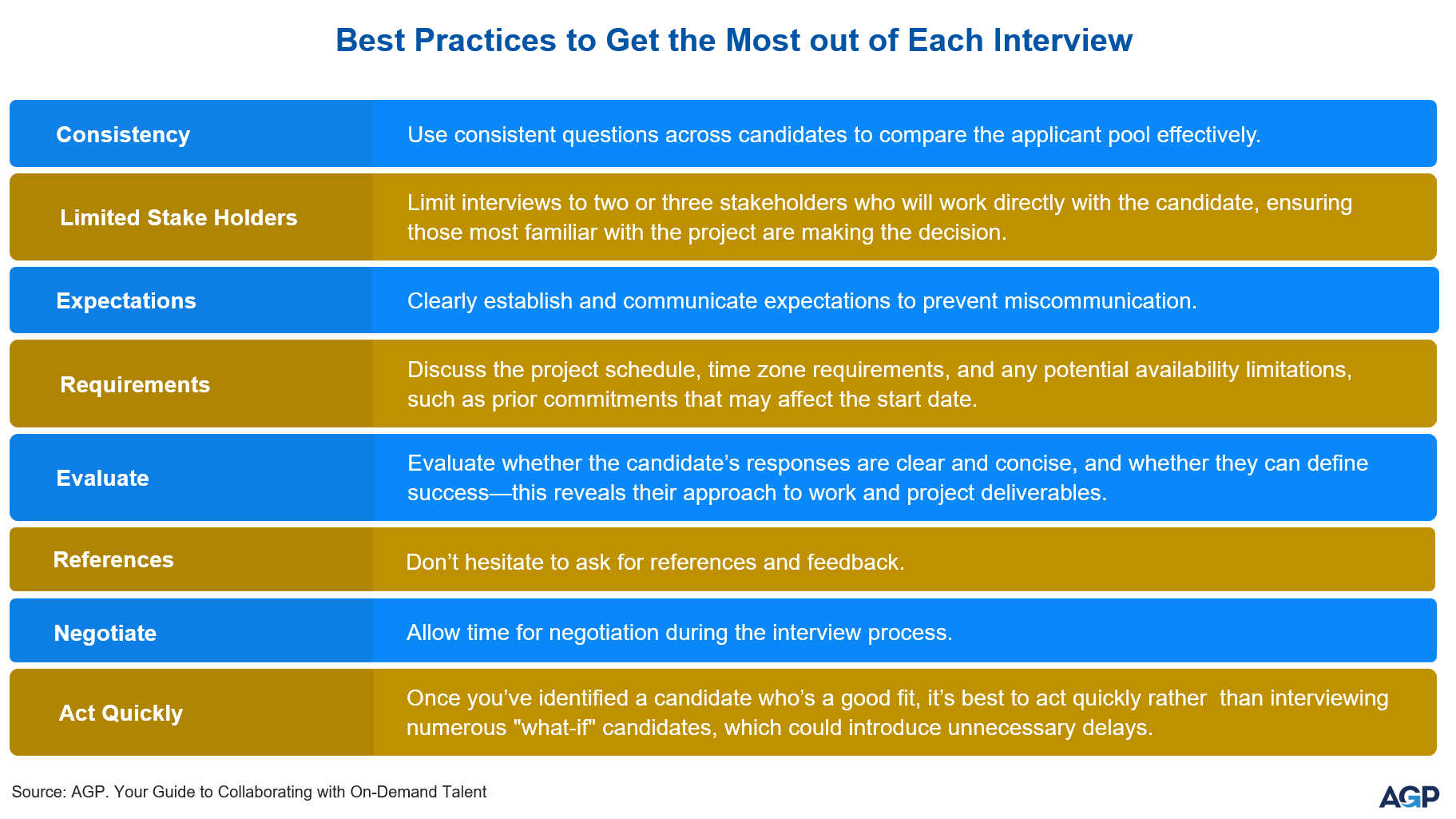A Guide to On-Demand Workforce Collaboration
The global workforce is at a turning point. As businesses adapt to a fast-changing landscape marked by innovation and disruption, they increasingly turn to a transformative solution: on-demand talent.
This approach brings in independent professionals—consultants, technical experts, and interim leaders—who operate outside the confines of traditional employment but deliver targeted, impactful results.
The Shift to On-Demand Talent
In the wake of global shifts such as the pandemic and rapid digitization, professionals are reassessing their priorities. The ability to work independently, choosing meaningful projects and flexible schedules, has become a significant draw.
For companies, this movement translates to an unprecedented opportunity to access specialized skills without committing to the costs and time associated with permanent hires. Businesses can now tap into a global talent pool, securing expertise for projects ranging from data analytics to supply chain optimization.
This shift is particularly pronounced in industries undergoing rapid transformation. For example, the tech sector is leveraging on-demand talent for agile development, while healthcare organizations are engaging independent experts to drive patient-centric innovations. These professionals bring diverse experiences, offering solutions untainted by internal biases or legacy practices.
Attracting the Best Talent
Attracting top-tier independent professionals begins with understanding their motivations. Unlike traditional employees, these experts prioritize the quality of their projects and the freedom to operate on their own terms. Companies that succeed in this competitive space position themselves as collaborators rather than employers.
A compelling project mission is often the first step. Independent talent is drawn to roles that challenge their skills and align with their career narratives. For instance, a supply chain strategist might be enticed by a project that involves redesigning logistics for sustainability, while a data scientist may gravitate toward opportunities involving cutting-edge AI applications.
Flexibility is another critical factor: 57% of independent professionals chose this path to have more flexibility in their work hours. Organizations that embrace remote work and flexible hours demonstrate a commitment to empowering their on-demand talent. This approach not only widens the candidate pool but also fosters trust.
When to Engage On-Demand Talent
Businesses often turn to these professionals during critical junctures—whether to address skill shortages, manage leadership transitions, or accelerate transformative initiatives.

The following are some of the most impactful scenarios for leveraging independent professionals. For a more detailed overview, download our guide.
When You Have Immediate Needs and Need to Move Quickly
On-demand talent is especially valuable for addressing short-term, urgent priorities. This approach is effective for both large initiatives requiring immediate attention and smaller tasks that have been deprioritized. By doing so, internal teams remain focused on long-term goals while independents tackle pressing needs with expertise.
For Targeted Help or Expertise—For a Limited Period
Independent talent provides immediate, specialized support for specific projects or challenges. For instance, a delayed critical project can benefit from an experienced independent project manager to get back on track. Similarly, when exploring a new market or navigating unfamiliar opportunities, these professionals offer strategic guidance to align efforts with broader objectives.
When Tackling Post-Strategy Projects or Smaller Tasks Unsuitable for Big Firms
Many companies have projects that are important but not large enough to warrant engaging a traditional consulting firm. These include initiatives such as updating a business plan or reassessing technology vendors. Independent professionals can deliver high-quality outcomes at a lower cost and with greater flexibility than large consulting teams. They are particularly adept at following up on strategic plans developed by larger firms, ensuring smooth execution and driving success in smaller-scale tasks.
For Recurring Support on Specific Knowledge Gaps
Agile companies recognize their knowledge gaps and proactively plan to address them. On-demand talent can provide recurring support for tasks like business case development or a unique moment, such as a major transformation.
To Make the Most of a Temporary Leadership Gap
Leadership transitions can be challenging but offer opportunities to introduce new skills, re-evaluate roles, or implement lasting change. Bringing in an independent interim leader allows companies to objectively assess their culture, challenges, and objectives, providing valuable insights before committing to a permanent hire.
Dispelling Myths About Independent Talent
Despite their growing prominence, misconceptions about independent professionals persist.
A common myth suggests that truly talented individuals would hold full-time roles. However, the majority of independents actively choose this path, with only 21% citing job loss as their reason. Additionally, fewer than half (43%) would even consider returning to traditional employment, emphasizing their preference for autonomy and flexibility.
Another misconception is that senior professionals avoid hands-on work. In reality, many independents seek practical, impactful roles rather than focusing solely on strategy.
Moving Quickly to Secure Top Talent
High-end independent professionals are redefining agility and performance for companies, but the competition for their expertise is fierce. These in-demand individuals have a wealth of opportunities, making it critical for organizations to act swiftly and decisively. Delays in decision-making often lead to losing top candidates to competing projects.
To succeed, businesses must streamline their hiring processes. This begins with pre-scoping the project—identifying essential skills, deliverables, and realistic budgets—while ensuring that the right stakeholders are involved in decision-making. Clear priorities and efficient communication are key to expediting the process.
Additionally, organizations should focus on immediate needs, seeking candidates who meet essential criteria, such as relevant experience, working style, and availability.

How to Manage Independent Talent and the Internal Teams They Support
One of the greatest advantages of independent talent is their ability to collaborate seamlessly with your existing team.
However, managing blended teams—combining internal and external resources—requires a thoughtful approach to ensure success.
Start with robust onboarding, providing access to tools, data, and clear expectations. Define roles to avoid overlap, clarify deliverables with structured milestones, and maintain regular communication. Prepare for post-project transitions with training materials and knowledge transfer plans and reengage proven independents for future work when possible.
Institutional knowledge is essential for improving collaboration. Share success stories and best practices from previous engagements with independent talent to build trust and streamline team dynamics. Highlight examples of how others within the organization have successfully managed blended teams to reduce barriers and encourage collaboration.
Maximizing the Value of Your Independent Engagement
The value of independent professionals goes far beyond their deliverables. Companies must adopt a strategic mindset, focusing on outcomes rather than hourly rates. Here’s how to achieve that:
Set Clear KPIs
While it might seem obvious, outlining key deliverables and milestones upfront, ideally in your Statement of Work (SOW), ensures everyone is aligned. Clear communication of these goals helps avoid misunderstandings and provides a concrete way to measure success and efficiency.
Schedule Weekly Check-Ins
Frequent communication is essential to keep projects on track. Weekly check-ins, whether through email, calls, or other preferred methods, help maintain strategic alignment and offer opportunities to provide feedback. These regular updates ensure progress remains steady and any potential issues are addressed promptly.
Avoid Scope Creep
While independent professionals often bring flexibility and broad expertise, asking them to take on additional tasks beyond the agreed scope can dilute their focus and compromise core deliverables. Allow them to concentrate on their key objectives, ensuring the highest quality outcomes.
Learn as You Go
Take advantage of informal check-ins to reassess progress and goals. Unlike traditional consulting teams that work in isolation, independent professionals often engage in ongoing, less formal conversations with clients. These frequent discussions can help avoid pitfalls, leverage new insights, and make mid-course adjustments, improving the project outcome.
Assume Positive Intent
Mistakes will happen, but they can lead to valuable insights. Independent professionals may make smart mistakes or offer candid feedback that internal teams might avoid. Instead of assigning blame, use these moments to reassess your approach. Often, what appears to be a mistake can lead to breakthroughs.
Build a Talent Cloud
Establishing a network of trusted independent professionals ensures quick access to proven talent for future projects. A ready roster of experts reduces onboarding time and enhances continuity, giving businesses a competitive edge in handling new challenges.
Wrapping Up and Building Long-Term Value
An open conversation at the end of the project helps identify areas for improvement. Ask your talent for feedback on the project, your processes, and the organization.
A well-executed project closeout includes a comprehensive review of deliverables, knowledge transfer to internal teams, and discussions about potential future collaborations.
AGP Insights
Download PDF.
Your PDF report was sent successfully to your inbox!
Related Insights.











